The evolution of smart home technology has transformed our living spaces into more efficient, comfortable, and responsive environments. With the advent of human-level artificial intelligence (AI), these transformations have reached new heights. In this blog post, we will explore the role of AI in revolutionizing smart homes and the numerous ways it enhances daily life.
AI in Home Automation and Control
AI plays a crucial role in automating home functions such as lighting, heating, and security. By learning user preferences and behaviors, AI-driven systems can adapt and optimize these functions to suit individual needs. For example, smart thermostats use AI algorithms to analyze user behavior and adjust temperature settings accordingly, resulting in energy savings and increased comfort.
Energy Efficiency and Sustainability
AI is also contributing to sustainability and reducing environmental footprints in smart homes. By analyzing energy consumption patterns, AI platforms can identify areas for improvement and suggest energy-saving measures. Additionally, AI-driven systems can integrate with renewable energy sources, such as solar panels, to maximize energy efficiency.
AI in Home Entertainment and Personalization
AI enhances home entertainment experiences by providing personalized content recommendations and creating immersive environments. Streaming services, for instance, use AI algorithms to analyze viewing habits and preferences, offering tailored suggestions for movies and TV shows. AI can also integrate with home entertainment systems to create immersive experiences, such as intelligent lighting and surround sound.
Health Monitoring and Wellness
AI-driven smart home devices are revolutionizing health monitoring and contributing to overall wellness. From wearable devices that track vital signs to AI-powered virtual assistants that remind users to take medication, these technologies have the potential to improve healthcare outcomes. AI applications are also being developed to assist in elder care, monitoring health metrics and providing timely assistance when needed.
Privacy and Security Challenges
While the benefits of AI in smart homes are evident, there are also privacy and security concerns that need to be addressed. Data protection and the ethical use of personal information are paramount. Strategies such as data encryption, user consent, and transparent data handling practices can help mitigate these concerns and ensure the responsible use of AI in smart homes.
The Future of AI in Smart Homes
The future of AI in smart homes holds immense potential for further transformation. Advancements in AI algorithms and hardware are expected to make smart home systems even more intelligent and intuitive. However, questions about the long-term impact on home life and privacy remain. It is crucial to strike a balance between innovation and user privacy, ensuring that AI continues to enhance our lives without compromising our personal information.
Engaging with the Audience
We invite you to share your thoughts and experiences with AI-driven smart home technology. What benefits have you experienced? What concerns do you have? Let’s engage in discussions about the potential benefits and drawbacks of integrating AI into our home environments.
Conclusion
AI is revolutionizing smart homes, transforming them into efficient, comfortable, and personalized spaces. From automation and energy efficiency to entertainment and health monitoring, AI is enhancing our daily lives in numerous ways. As we embrace these advancements, it is crucial to prioritize user privacy and ethical considerations, ensuring that AI continues to serve us while respecting our personal information.










